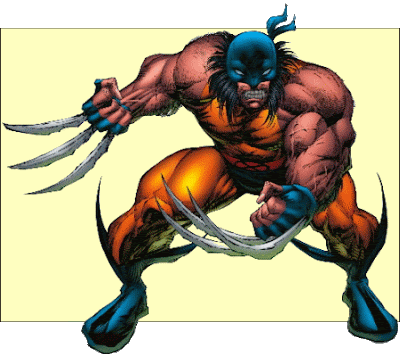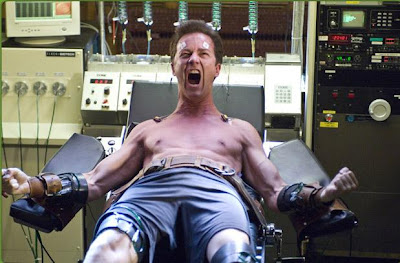Flashpoint of No Return
When can someone no longer be considered a hero? Are there actions that cannot be reconciled with common morality? This is not an easy question to answer. Anything can be forgiven, but some things cannot be undone and those things can demonstrate that a person does more harm than good or cannot be trusted. In some circles, there is a concept of a point at which a character has gone too far and all sympathy is lost, making the character irredeemable. This is called the Moral Event Horizon. I recently watched Barry Allen - TV's The Flash - run past this point at speeds faster than the human eye can follow in an animated movie called Flashpoint Paradox.
Heroes have certain standards that they uphold, often including certain things that they will not do. Batman and Superman, very famously, do not kill, except when they do. People have argued that heroes, as a general rule, do not kill, but this ignores the fact that, in real life, heroes definitely do kill. Sometimes, when defending one's country or fighting for an ideal, lethal force is regrettably called for. Certainly, none of us would enjoy the lifestyle we do if others were not willing to kill and die for it. However, the same standards and tactics that apply to soldiers in times of war cannot and must not apply to law enforcement officials. As for superheroes, not all of them serve the same function, so one cannot make a blanket statement about what behaviour is universally acceptable for them. Some superheroes are soldiers, some are police officers, some are vigilantes, and some are space adventurers. While space adventurers are not a thing in real life, I will go on record as saying that astronauts definitely should never kill, no matter what anyone else thinks.
What people generally mean when they say that superheroes should not kill is that vigilantes should not kill. This makes sense - if someone is authorized to take a life, there must be a system in place to hold people accountable when they do, which vigilantism as portrayed in superhero comics and movies doesn't provide. What they often fail to add is that in most cases, vigilantes shouldn't exist. Most superheroes are on shaky moral ground to begin with, considering that they are enforcing laws that they have no authority to enforce. Private citizens violently meting out their own interpretation of justice is a good way to get innocent people injured or killed. Even people who have the authority to kill should always avoid doing so. Respect for human life is essential for anyone who is meant to be seen as a good guy, and doubly so for anyone capable of killing. Anyone being killed is unfortunate, and any time someone is killed, people will question whether it was necessary. That is why if you want a character to unequivocally be considered a good guy, there are certain things that character absolutely cannot do, and that includes killing.
Not every story needs an unequivocally good hero, though. Moral ambiguity is a useful tool. Exploring the limits of morality allows us to examine morality. Questioning what our moral standards are and why is a good thing. In case you couldn't tell, that's what I'm doing right now. The problem with moral ambiguity is mostly just that most writers are really bad at showing it. Moral ambiguity arises when people on both sides of a conflict believe that they are doing what is in people's best interest or when a character is in a situation where there is no clear right course of action and these situations can raise fascinating questions about the nature of morality, but writers who are drawn to morally ambiguous antiheroes as protagonists are usually uninterested in posing any question deeper than, "Is murder justified if you look really cool doing it?" Take as an example Dexter Morgan from the television show Dexter, who is a murderer who works for the police force and murders murderers. People like to refer to him as a morally ambiguous antihero, but there really isn't any ambiguity at all. A bad guy who victimizes bad guys is not the same thing as a good guy. Saying that Dexter is morally defensible is like saying that gang violence is a good thing so long as gang members are being killed. Two wrongs do not make a right, and if you need to be told that, then you are way too young to be watching a show like Dexter.
Now that we have established that, even in a world where morality is not absolute, there are certain lines that heroes simply cannot cross without well thought out justification and most people have given up reading this, we can look at Flashpoint Paradox. In this movie, Barry Allen awakens to a world where he is not the Flash, Batman is not Bruce Wayne, and the world is about to be destroyed in the war between Atlantis and Themiscyra. Also, Cyborg is working for the President, which Batman thinks is terrible for some reason that we are supposed to understand without it being explained to us. Obviously, history has been changed, plunging the world into dystopia. Barry must search for the villain responsible for changing events in the past and dooming all of humanity. The spoiler that he finds is that he is in fact that villain. Barry himself had changed history by going back in time to his childhood and preventing his mother's murder. After this, the story valiantly pretends that Barry is still the hero as he goes back in time to stop himself from killing everyone.
Some of you may be shocked that I consider the Flash unforgivable when all he wanted to do was save his mother's life. I will admit that Barry's intentions were admirable, but that doesn't excuse how stupidly, homicidally irresponsible his actions were. His plan was to change something in the past, so he had all the time in the world to rationally consider his decision. Seeing how his decision would affect everyone in his life, he probably should have consulted other people before trying it. I know he didn't, because anyone could have told him how idiotic his plan was. Barry knew that becoming the Flash was an accident that occurred only because of a very specific set of circumstances, circumstances that a major difference in his life - like having a mother - would negate. It wouldn't be inconceivable that his mother's murder was a factor in him pursuing forensic science as a career. Even if it wasn't, he might have ended up going to a different school, living in a different city, working for a different precinct, or any other tiny thing might have been different. In short, he was basically guaranteeing that he would not become the Flash. Giving up his superhero life for his mother could be seen as a difficult choice or even a noble sacrifice if being the Flash was only for his own benefit or just helping out his community. It doesn't quite work that way if he had ever personally won or turned the tide of a fight where the fate of the world was at stake, which he knew had happened multiple times. Hell, any time after 1985, he may not even have had a reality to wake up to. For all he knew, when he woke up, the few survivors of the Crisis on Infinite Earths could be living as slaves to antimatter overlords or antimatter gorillas. Either way, Darkseid would definitely control multitudes of planets, possibly including Earth, and Darkseid may have also been turned into a gorilla. These would be logical, foreseeable consequences to Barry never becoming the Flash, but in all probability, everyone on Earth would just be dead. This is not an acceptable risk for a hero to take.
Consider Star Wars. Who is the hero of Star Wars? Is it Han Solo - the amoral smuggler who kills people over his own legitimate debts? Is it Obi Wan Kenobi, who gets a naïve farm boy on his side by blatantly lying about his own history and the boy's father? Is it Luke Skywalker, that same farm boy who blows up manned spacecrafts killing unknown numbers of people and ultimately overthrows a government that even more people likely depend on for their livelihood? The audience was on the side of these characters despite their questionable actions, and we know the heroes were on the right side because Grand Moff Tarkin blew up a fucking planet. Even though we have no idea of what the Rebels' plans were after the Empire was destroyed or how they felt a galaxy should be governed, the current government is run by a madman who condones planet explosions. Anyone who is willing to destroy the world is a monster that must be stopped.
Barry Allen is a monster that must be stopped. When the world is at stake, the bad guy is the one who is trying to destroy the world and the good guys are the ones trying to stop him. In the context of Flashpoint Paradox, that means that Professor Zoom is the hero and Barry Allen is the villain. If you are trying to argue that Barry is actually a nice guy and that destroying the world was an accident, you have to establish that he didn't know the world would be destroyed, which given what we know about the Flash, would make him staggeringly stupid. Even still, "Barry Allen is a hero because he is unbelievably stupid" makes much less sense than "Barry Allen should not be using his potentially reality destroying super powers because he is unbelievably stupid."
At the end of the Flashpoint Paradox, The Flash goes back to being a superhero as though nothing had happened and the audience is expected to be OK with this. I was kind of hoping that some magic or time based superhero would find out about what Barry had done and that he would be imprisoned or kicked out of the Justice League or depowered or forced to undergo extensive training, or that something would be done to make sure that this man who is a clear threat to every living thing is not able to do anything so stupid or harmful ever again. I think I understand why some people would think that Barry's actions were a simple mistake or even that they were noble. There is this idea that a hero is someone who is willing to go to any lengths and stop at nothing to save lives. That is a romantic idea, but you really should add to it the phrase "within reason." Nobody should be willing to make deals with the devil or destroy the world. People who are willing to do that are not heroes.





























